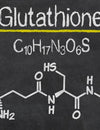This antioxidant is lower in neurodegenerative diseases like Alzheimer’s.
There are good reasons why the body produces its own antioxidant enzymes.
All tissues including the nervous system and the brain are exposed to free radical damage. The most important antioxidant the body is making is probably glutathione.
Humans with neurodegenerative and neuropsychiatric disorders have demonstrated altered levels of glutathione and oxidized glutathione (Gu F, et.al., 2015).
A decreased ratio of glutathione to oxidized glutathione has been found in the blood and brain of these individuals.
Glutathione depletion can lead to abnormalities of a mitochondrial function where the cells make energy. A few studies have shown that glutathione deficiency occurs prior to neuropathological abnormalities.
These researchers found that glutathione was significantly decreased in the red blood cells from male patients with Alzheimer's disease (Liu H, et.al., 2004).
The most common form of glutathione is reduced glutathione, but don't take that.
This form of glutathione is oxidized in the stomach and does not provide many benefits. S-acetyl glutathione on the other hand gets into the cells where it's needed (Cacciatore I, et al., 2010).
References:
Cacciatore I, Cornacchia C, Pinnen F, Mollica A, Di Stefano A.Prodrug approach for increasing cellular glutathione levels.Molecules. 2010 Mar 3;15(3):1242-64.
Gu F, Chauhan V, Chauhan A.Glutathione redox imbalance in brain disorders.Curr Opin Clin Nutr Metab Care. 2015 Jan;18(1):89-95.
Liu H, Wang H, Shenvi S, Hagen TM, Liu RM.Glutathione metabolism during aging and in Alzheimer disease.Ann N Y Acad Sci. 2004 Jun;1019:346-9.

![]() Effective S-Acetyl Glutathione
Effective S-Acetyl Glutathione
- Glutathione is your primary defense against aging.
- Glutathione helps detoxify your body.
- Regular glutathione is not very bio-available, but this problem has now been solved when using S-Acetyl Glutathione which is very effective.
- Increased oxidative stress and lower antioxidant levels are associated with mood disorders and depression.









